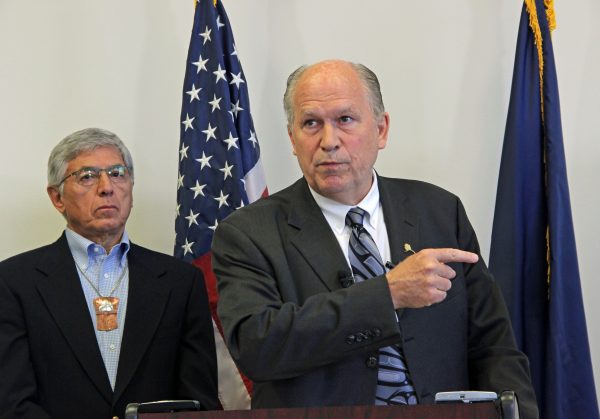
Gov. Bill Walker says the state’s three oil company partners told his administration this winter they weren’t sure they could move ahead with efforts to build a natural gas line — and suggested the state take over.
Walker’s comments came a day after lawmakers grilled his point person on the Alaska LNG project.
Meanwhile, the companies expressed skepticism about the state-led approach, telling a slightly different story.
In its current form, the state holds a 25 percent share of the project, partnering with ExxonMobil, BP and ConocoPhillips.
But Walker said today that in a meeting on Feb. 9, the three companies said they weren’t sure they’d be able to continue the project next year as planned — and offered two options: slow down work, or let the state take control.
“The words they used [are], transition the project over to the state,” Walker said. “Those were the exact words that they used. That took us completely by surprise.”
Companies told a slightly different story to lawmakers on Wednesday. Representatives of ExxonMobil and ConocoPhillips said they had just received the concept for a state-controlled gas line last week – the same week it was made public to reporters.
Walker said he found that testimony puzzling.
“Not only did they understand it, it was their idea, it was their concept that they brought to us. So I’m a little surprised,” he said. “Now, what they could mean is that this is the first time they’ve seen this specific on-paper proposal, as a follow-up to what they had proposed. Perhaps that was what they were saying. But the concept – goodness, it was one that they brought to us.”
The companies also told lawmakers the state had suspended negotiations over the gas line this spring. Walker confirmed that; he said after the Feb. 9 meeting, the companies wanted to continue negotiations on “fiscal certainty,” or locking in tax rates on the project. But, he said, with the project structure up in the air, the state didn’t see the point in continuing the expensive negotiations, and broke them off.
Either way, in testimony on Wednesday, the companies did not seem enthusiastic about a state-run project.
All three stressed that the key issue is whether an Alaska natural gas project can compete in the current market — in other words, whether it can be built cheaply enough to match the price of gas coming from other regions, including the Lower 48.
The partners have been trying to bring down costs, but the companies made clear they don’t believe the project is there yet.
Alaska BP regional manager David VanTuyl said he understands the state’s desire for a gas line that might bring in new revenue next decade, especially given Alaska’s budget situation.
“But we don’t want to move quickly at all costs,” he said. “We don’t want to rush into the largest energy project in North America that only ends up losing lots of money for all of us.”
Lawmakers were also skeptical. They grilled the new head of the state-owned Alaska Gasline Development Corp., Keith Meyer, for more than four hours.
Meyer was blunt. The existing partnership may have made sense a year ago, he said. But the market has changed.
“I think we need to recognize that under the current path, this project is not going forward,” he said.
Meyer has proposed a state-controlled project that could bring in outside investors to cover the estimated $45 to $65 billion price tag, insisting that increased state ownership does not have to mean increased costs.
But many lawmakers remained unconvinced.
Rep. Mike Hawker, R-Anchorage, asked if Alaska is prepared to take on the added risk that comes with a bigger stake.
Sen. Peter Micciche, R-Soldotna, said he doesn’t see why the project needs to move forward immediately. “I don’t subscribe to the ‘build it now or die’ mentality,” he said.
Sen. Mike Dunleavy, R-Wasilla, was perhaps the most succinct. “My confidence is waning,” he said.
But it was Rep. Andy Josephson, D-Anchorage, who touched on the heart of the issue. If this project doesn’t work for the big three oil companies, he said, why would it work for the state?
“I’ve sort of felt like, if the three majors saw merit in moving forward, the plan had merit, and if they didn’t, it likely didn’t,” he told Meyer. “Is there something you can tell me that would dispel that general concern?”
Meyer said the three companies have to weigh the Alaska project against many others in their portfolios. Just because it comes up short for them, he said, doesn’t mean it’s not worth it for the state.
But, Meyer said, that’s what Alaska has to find out.
Rachel Waldholz covers energy and the environment for Alaska's Energy Desk, a collaboration between Alaska Public Media, KTOO in Juneau and KUCB in Unalaska. Before coming to Anchorage, she spent two years reporting for Raven Radio in Sitka. Rachel studied documentary production at the UC Berkeley Graduate School of Journalism, and her short film, A Confused War won several awards. Her work has appeared on Morning Edition, All Things Considered, and Marketplace, among other outlets.
rwaldholz (at) alaskapublic (dot) org | 907.550.8432 | About Rachel




